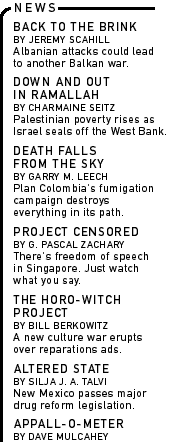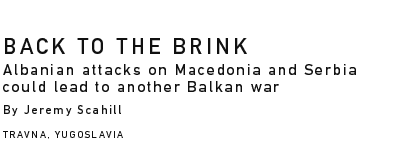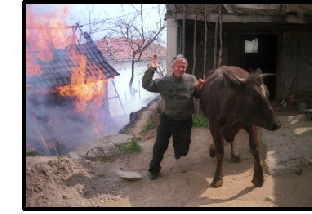

|

|

|

|
| |
|
|
|
Two years after the beginning of the NATO bombing of Yugoslavia, the Balkans are careening toward the brink of yet another war. But with Slobodan Milosevic gone from power, it is not Belgrade that is the instigator this time. Armed ethnic Albanians--once the darlings of the West--are dramatically expanding their violent campaign for a greater Kosovo beyond the borders of Yugoslavia and into Macedonia. What two years ago was portrayed as a fight to liberate the Kosovo Albanians from Serb repression is evolving into a war against Slavic governments in the region. The Albanian rebels' regular attacks on Yugoslavian security forces and Serb villages,
The northern town of Tetovo has been the latest flashpoint, with Macedonian security forces pounding positions of the so-called National Liberation Army (whose Albanian acronym UCK is identical to that of the KLA). In late March, after securing varying degrees of support from Western governments and strong backing from Russia, Macedonia launched an offensive against the militants, retaking villages held by the UCK. The offensive was bolstered by weapons shipments from neighboring Bulgaria and four Mi-24 attack helicopters from Ukraine. Yugoslavia's defense forces have been eager to carry out this type of action in southern Serbia, with officials saying it would take a maximum of two days to complete (see "War Without End," March 19). But both NATO and the new authorities in Belgrade have been reluctant to authorize such an offensive, given the recent history. Recently, however, the armed Albanians operating in Serbia repeatedly have broken a fragile NATO-brokered ceasefire. In addition to regular attacks on army and police positions, the Albanian militants have taken four Serbian civilians hostage along with two Yugoslav Army soldiers. This is quickly making the argument for restraint from Yugoslavia's forces untenable. Though the publicly stated aim of the armed Albanians in both Serbia and Macedonia is to gain greater rights for Albanian people, behind the scenes the rhetoric is more transparent. At an armed Albanian camp near the Yugoslavia-Macedonia border, commanders say they are fighting against "Slavic terror" and intend to annex Albanian-populated areas of both countries and unite them with Kosovo. At the base of the Liberation Army of Presevo, Medvedja and Bujanovac (UCPMB) in the Serbian village of Lucane, an Albanian commander who identifies himself as Ardian says that if Yugoslavian forces attempt to retake the village, "We won't be awaiting them with flowers." Another young fighter adds bluntly: "We'll die here before we let them back." Such a battle may not be far off. NATO has given the Yugoslavian army the go-ahead to further deploy its forces in the NATO-imposed buffer zone separating Kosovo from Serbia. The zone--which the army had been banned from entering since the end of the NATO bombing--includes the main strongholds of the UCPMB militants. Announcing the deployment, NATO Secretary General Lord George Robertson stood beside U.S. Secretary of State Colin Powell and said, "It is unacceptable for the Ground Safety Zone to be used as some kind of safe-haven for extremists." The move outraged Albanians in the area. Riza Halimi, the head of the Party for Democratic Action--the largest Albanian political party in the Presevo Valley--says NATO should be widening the zone instead of reducing it. "We cannot see this deployment as anything other than open pressure on the Albanian population in this region," Halimi says. "There is now a real danger for a further ethnic cleansing which will escalate the already difficult situation." As Yugoslavian army personnel carriers zoomed past the predominantly ethnic Albanian village of Trnava along the Macedonian border, villagers gathered at a corner store. "NATO made a mistake and we are going to suffer because of that," says Baki Beqiri, an unemployed factory worker. "That army was in Kosovo and they massacred our people." Despite the ire it is evoking from the Albanian community, the rhetoric emanating from NATO headquarters in Brussels is that of support for both Yugoslavia and Macedonia. As Robertson said recently, "NATO will not permit a changing of borders in the Balkans." But the reality remains that the forces attacking both countries are supplied from Kosovo, which is under a joint U.N./NATO administration. Macedonian Prime Minister Ljubco Georgievski recently blasted the United States and Germany--whose troops patrol the areas of Kosovo bordering northern Macedonia--for failing to halt the "terrorist" attacks against his country. "You can't persuade anyone in Macedonia today that the governments of the United States and Germany do not know who the terrorist leaders are and what they want," he said. "They could stop them." Yugoslavian President Vojislav Kostunica echoed those sentiments
in Belgrade. He accused the NATO-led forces in Kosovo of having
"stimulated terrorism" instead of fighting it. "I ask once again:
Is NATO a military or a humanitarian organization? What is the reason
for its presence there?" Kostunica described the return of the Yugoslavian
forces to the buffer zone as "one more proof of how inefficient
in all these years KFOR has been." Jeremy Scahill is a journalist based in Belgrade. He reports frequently for Pacifica radio.
|


